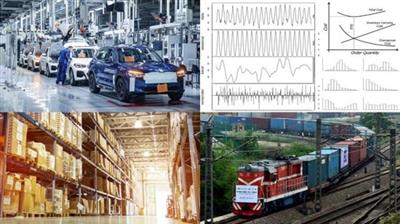
MP4 | Video: h264, 1280x720 | Audio: AAC, 44.1 KHz, 2 Ch
Genre: eLearning | Language: English + srt | Duration: 51 lectures (4h 51m) | Size: 2.18 GB
Your first steps in descriptive, predictive and prescriptive analytics to solve your toughest supply chain problems
What you'll learn:Fundamental tools of descriptive, predictive and descriptive analytics
How to answer the questions, "What happened?", "What will happen?", and "What should we do?"
Analytical tools for assessing demand forecasts, production outputs and product mix strategies
Introductory time series analysis tools
Baseline, Trend, Seasonality and Error
Linear programming using Excel Solver
Statistical tools in Excel like quartiles, the data analysis tool kit, Norminv, linear regression, mathematical programming, and more!
How to use the Economic Order Quantity (EOQ)
"Launch points" for further study in analytics
RequirementsBasic Microsoft Excel skills
Basic understanding of manufacturing or logistics
Basic business acumen
Some supply chain or operations experience would be helpful.
DescriptionMany industry analyst predict that both supply chain management and analytic will be among the most in-demand workplace skills the coming years. This class, "Introduction to Supply Chain Analytics using Microsoft Excel" will teach you many of the fundamental tools of descriptive (What happened?), predictive (What will happen?), and prescriptive (What should we do?) analytics, all within the familiar context of Excel.
In the descriptive analytics section you will learn:
Example of parametric and nonparametric statistics
Measures of central tendency and dispersion
How to use the normal distribution to describe processes
How to combine the normal random variables
How to calculate process yield
Lots of practical applications for descriptive analytics
In the predictive analytics section you will learn:
The basics of time series analysis
How to build a linear regression model in Excel
How to calculate seasonality
How to combine baseline, trend and seasonality to build forecasts
How to use Excel Data Analysis Add-in
Real life applications of time series forecasting
In the prescriptive analytics section you will learn:
The basics of mathematical programming
How to use Excel's Solver Add-in
How to build data models using objective functions and constraints
The Economic Order Quantity and how to use it to cut your Total Inventory Costs
How to integrate management policies into your linear programs
How to apply linear programming in a "classic" product mix problem
Who this course is forSupply chain managers
Manufacturing professionals
Inventory analysts
Logistics professionals
Production planners
Buyers
Purchasing managers
Industrial engineers
Quality engineers and managers
Operations managers
DOWNLOAD:
- Citación :
https://rapidgator.net/file/df7ddbcafb48d7c1434ede41b3e5a1a3/absij.Introduction.to.Supply.Chain.Analytics.using.Microsoft.Excel.part1.rar.html
https://rapidgator.net/file/7c71b5a170f3afab1fd3dd79f1a2f50a/absij.Introduction.to.Supply.Chain.Analytics.using.Microsoft.Excel.part2.rar.html
https://rapidgator.net/file/039fff74593fad7eb0b4bf05813f873d/absij.Introduction.to.Supply.Chain.Analytics.using.Microsoft.Excel.part3.rar.html
https://uploadgig.com/file/download/C7b4614ee71Df5de/absij.Introduction.to.Supply.Chain.Analytics.using.Microsoft.Excel.part1.rar
https://uploadgig.com/file/download/A3581c515e4C31bb/absij.Introduction.to.Supply.Chain.Analytics.using.Microsoft.Excel.part2.rar
https://uploadgig.com/file/download/8224d16e04a2d8Df/absij.Introduction.to.Supply.Chain.Analytics.using.Microsoft.Excel.part3.rar
https://nitroflare.com/view/D864C9826625EF1/absij.Introduction.to.Supply.Chain.Analytics.using.Microsoft.Excel.part1.rar
https://nitroflare.com/view/647CB2164307B18/absij.Introduction.to.Supply.Chain.Analytics.using.Microsoft.Excel.part2.rar
https://nitroflare.com/view/561A6A5043A358F/absij.Introduction.to.Supply.Chain.Analytics.using.Microsoft.Excel.part3.rar
